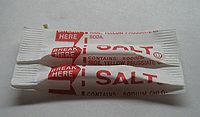
From the NYtimes:
“When you reduce salt, you reduce blood pressure, but there can also be other adverse and unintended consequences. As more data have accumulated, it’s less and less supportive of the case for salt reduction, but the advocates seem more determined than ever to change policy.”
References:
Findings - When It Comes to Salt, No Rights or Wrongs. Yet. - NYTimes.com.
3-gram reduction in daily salt intake would decrease coronary heart disease, stroke, and death
Sweat Bees prefer sweaty people because the human diet is so salty that their perspiration is saturated with that essential nutrient. WSJ, 2012.
Sweat Bees prefer sweaty people because the human diet is so salty that their perspiration is saturated with that essential nutrient. WSJ, 2012.
Image source: Single-serving salt packets. Wikipedia, GNU Free Documentation License.